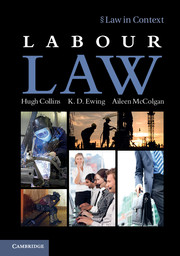Book contents
- Frontmatter
- Contents
- Preface
- Acknowledgments
- Table of cases
- Table of statutes
- Table of statutory instruments
- Table of European Union instruments
- Table of ILO instruments
- Table of other international instruments
- Abbreviations
- Part I Introduction
- Part II The contract of employment
- Part III Statutory regulation of the employment relationship
- Part IV Collective labour rights
- Part V Termination of employment
- 18 Wrongful dismissal
- 19 Unfair dismissal
- 20 Economic dismissal
- Index
- References
19 - Unfair dismissal
from Part V - Termination of employment
- Frontmatter
- Contents
- Preface
- Acknowledgments
- Table of cases
- Table of statutes
- Table of statutory instruments
- Table of European Union instruments
- Table of ILO instruments
- Table of other international instruments
- Abbreviations
- Part I Introduction
- Part II The contract of employment
- Part III Statutory regulation of the employment relationship
- Part IV Collective labour rights
- Part V Termination of employment
- 18 Wrongful dismissal
- 19 Unfair dismissal
- 20 Economic dismissal
- Index
- References
Summary
The statutory claim for unfair dismissal was introduced in 1971. Although some important details have altered since then, the general aim, structure and core principles of the law have remained constant. The aim of the legislation is to fill the major gap in the common law of wrongful dismissal by providing employees with a substantial remedy for unfairness and arbitrariness in the manner and reasons for dismissal. A claim must be brought by an employee before an employment tribunal. The applicable standards of fairness are mandatory and in principle cannot be excluded or modified by contractual agreement. The employment tribunal must determine whether or not the employer's reason for dismissal was unfair, and, if so, order a remedy of reinstatement or compensation.
The law of unfair dismissal has a crucial role to play in any labour law system. It represents the principal control afforded by the law over the misuse of managerial contractual and discretionary powers to discipline the workforce. It reduces, though never abolishes, the degree of subordination of employers to their employing organisation. More than that, the law of unfair dismissal provides a principal vehicle for workers to assert other labour rights, such as the right to be a member of a trade union and the right to enjoy civil liberties without unjustifiable interference by their employer. These labour rights and civil liberties can often only be vindicated by the employee bringing a claim for unfair dismissal.
- Type
- Chapter
- Information
- Labour Law , pp. 800 - 856Publisher: Cambridge University PressPrint publication year: 2012

